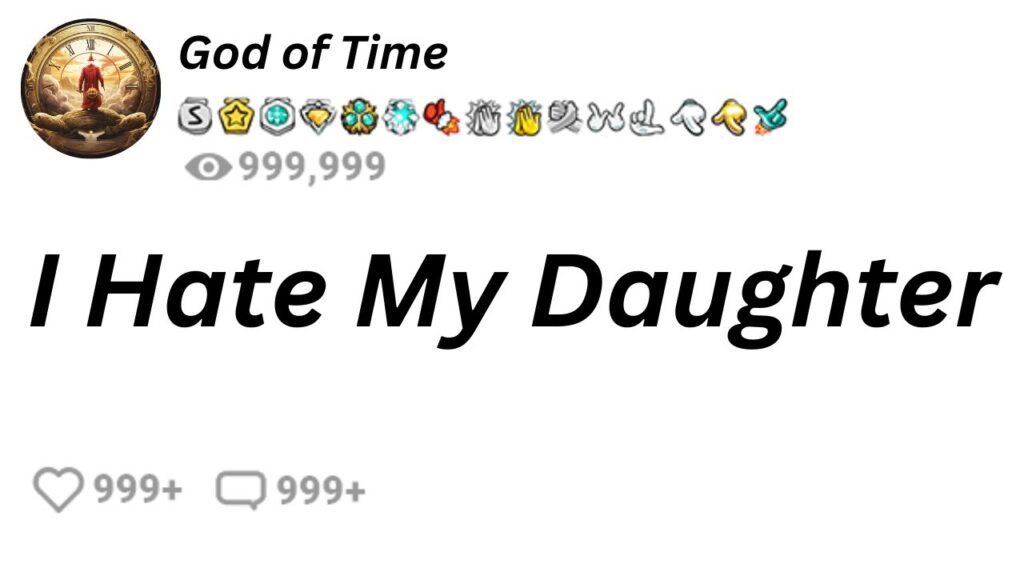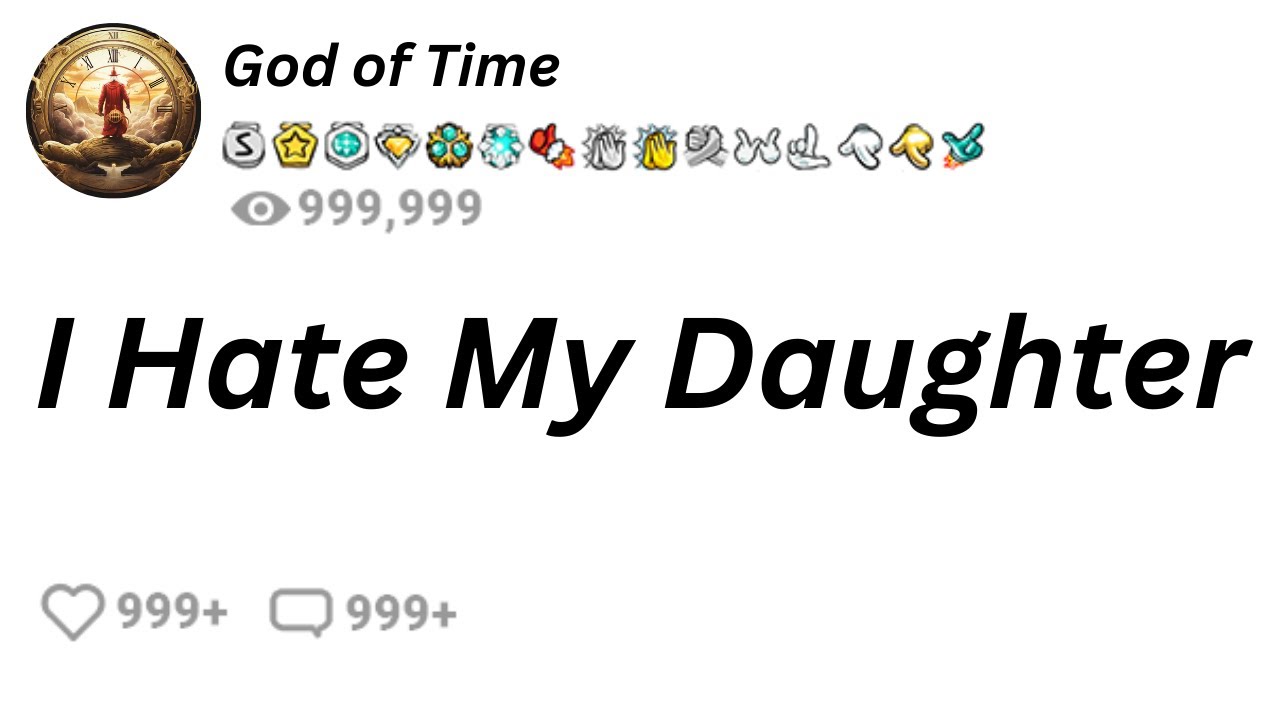
Navigating the Complex Emotions: When You Feel ‘I Hate My Adult Daughter’
The statement “I hate my adult daughter” is a jarring and painful admission, one often whispered in the dark corners of personal turmoil. It’s a phrase laden with guilt, shame, and a profound sense of failure. While the word “hate” is strong, it often masks deeper, more complex emotions like resentment, disappointment, frustration, and even fear. It’s essential to unpack these feelings to understand the root cause and find a path toward healing and resolution.
This article aims to explore the multifaceted reasons behind these feelings, offering insights and potential strategies for parents grappling with strained relationships with their adult daughters. We’ll delve into common triggers, explore healthy coping mechanisms, and provide resources for seeking professional help. It’s crucial to remember that acknowledging these difficult emotions is the first step toward addressing them constructively. Saying “I hate my adult daughter” might feel like the end, but it can also be the beginning of a journey towards understanding and potentially, reconciliation.
Understanding the Roots of Resentment
The parent-child relationship is arguably one of the most formative and enduring bonds in human life. When this relationship sours, the emotional fallout can be devastating. The feeling of “I hate my adult daughter” often stems from a build-up of unresolved issues, unmet expectations, and conflicting values. Let’s examine some common contributing factors:
- Unmet Expectations: Parents often have hopes and dreams for their children, envisioning specific career paths, lifestyles, or personal achievements. When an adult daughter deviates significantly from these expectations, it can lead to disappointment and resentment. The feeling of “I hate my adult daughter” can be linked to this sense of broken dreams.
- Conflicting Values: As children grow into adulthood, they develop their own set of values and beliefs, which may clash with those of their parents. Differences in political views, religious beliefs, or lifestyle choices can create friction and tension, leading to feelings of animosity.
- Past Trauma: Unresolved trauma from childhood, such as abuse, neglect, or parental conflict, can resurface in adulthood, impacting the parent-daughter relationship. These unresolved issues can manifest as anger, resentment, and difficulty forming healthy attachments.
- Personality Clashes: Sometimes, despite best efforts, personalities simply clash. Different communication styles, approaches to problem-solving, or general outlooks on life can create constant friction and misunderstandings.
- Financial Strain: Adult children who are financially dependent on their parents can create significant stress and resentment, especially if the parent feels taken advantage of or unsupported. This can lead to the feeling of, “I hate my adult daughter’s dependence on me.”
The Impact of ‘I Hate My Adult Daughter’ on Mental Health
Harboring negative emotions, particularly towards a family member, can have a significant impact on mental health. The constant internal conflict can lead to anxiety, depression, and chronic stress. It’s crucial to acknowledge the emotional toll and seek support to manage these feelings effectively. The persistent thought of “I hate my adult daughter” can be incredibly draining.
Ignoring these feelings can lead to:
- Increased Stress and Anxiety: The constant tension and emotional turmoil can manifest as physical symptoms like headaches, insomnia, and digestive problems.
- Depression: The sense of failure and disappointment can lead to feelings of sadness, hopelessness, and loss of interest in activities.
- Relationship Problems: The negativity can spill over into other relationships, impacting your ability to connect with your spouse, friends, and other family members.
- Guilt and Shame: The feeling of “I hate my adult daughter” can be accompanied by intense guilt and shame, leading to self-criticism and low self-esteem.
Strategies for Coping and Healing
While acknowledging difficult emotions is crucial, it’s equally important to develop healthy coping mechanisms and strategies for healing the relationship (or at least managing the conflict). Here are some steps you can take:
- Self-Reflection: Take time to examine your own role in the conflict. Are your expectations realistic? Are you projecting your own insecurities or unmet needs onto your daughter? Honest self-reflection is essential for identifying areas where you can change your perspective or behavior.
- Open Communication: If possible, attempt to have an open and honest conversation with your daughter. Express your feelings calmly and respectfully, focusing on specific behaviors rather than making personal attacks. Listen actively to her perspective and try to understand her point of view. If you feel “I hate my adult daughter,” consider what you might be able to do to improve the situation.
- Setting Boundaries: Establishing clear boundaries is crucial for protecting your emotional well-being. This may involve limiting contact, refusing to engage in certain topics, or setting financial limits. Communicate your boundaries clearly and consistently, and be prepared to enforce them.
- Seeking Professional Help: A therapist or counselor can provide a safe and neutral space to explore your feelings and develop coping strategies. They can also help you improve communication skills and navigate difficult conversations with your daughter. Family therapy can be particularly helpful in addressing systemic issues and improving family dynamics.
- Focusing on Self-Care: Prioritize your own well-being by engaging in activities that bring you joy and relaxation. This may involve exercise, meditation, spending time in nature, or pursuing hobbies. Taking care of yourself is essential for managing stress and maintaining emotional stability.
- Acceptance: Sometimes, despite best efforts, reconciliation may not be possible. In these cases, acceptance is key. Accept that your daughter is an individual with her own choices and values, even if you don’t agree with them. Focus on what you can control – your own thoughts, feelings, and behaviors – and let go of what you can’t.
When to Seek Professional Help
If you’re struggling to manage your emotions or if the conflict with your daughter is significantly impacting your mental health, seeking professional help is essential. A therapist or counselor can provide guidance and support in navigating these difficult emotions and developing healthy coping strategies. Consider seeking professional help if:
- You experience persistent feelings of anger, resentment, or sadness.
- You have difficulty sleeping or concentrating.
- You isolate yourself from friends and family.
- You engage in unhealthy coping mechanisms, such as substance abuse or overeating.
- You have thoughts of harming yourself or others.
Remember, seeking help is a sign of strength, not weakness. It demonstrates a commitment to your own well-being and a willingness to address the challenges in your relationship with your daughter. It’s important to remember that feelings of “I hate my adult daughter” are not uncommon, and there is support available.
Reframing the Narrative: From Hate to Understanding
While the phrase “I hate my adult daughter” is a painful expression, it’s important to reframe the narrative. Instead of focusing on hate, try to understand the underlying emotions and motivations. This requires empathy, compassion, and a willingness to see things from your daughter’s perspective.
Consider asking yourself these questions:
- What specific behaviors or actions are triggering my negative emotions?
- What expectations am I placing on my daughter? Are they realistic and fair?
- What unmet needs or unresolved issues am I bringing to the relationship?
- What can I do to improve communication and understanding?
By shifting your focus from hate to understanding, you can begin to heal the relationship and find a path toward acceptance and peace. It’s a process that requires patience, self-reflection, and a willingness to let go of expectations. Remember, the goal isn’t necessarily to eliminate all conflict, but to manage it in a healthy and constructive way. Thinking “I hate my adult daughter” is a starting point for change, not a final destination.
Resources for Support and Healing
Navigating a strained relationship with an adult daughter can be challenging and isolating. Fortunately, there are numerous resources available to provide support and guidance:
- Therapists and Counselors: Mental health professionals can offer individual or family therapy to address underlying issues and develop coping strategies.
- Support Groups: Connecting with others who are experiencing similar challenges can provide a sense of community and validation.
- Online Forums and Communities: Online forums and communities offer a space to share experiences, ask questions, and receive support from others.
- Books and Articles: Numerous books and articles offer insights and advice on navigating difficult family relationships.
- Family Mediation Services: A mediator can help facilitate communication and resolve conflicts between family members.
Don’t hesitate to reach out for help if you’re struggling. There are people who care and want to support you on your journey toward healing and reconciliation. Acknowledging that you feel “I hate my adult daughter” is a brave step, and seeking help is the next logical one.
Conclusion: Finding Peace and Acceptance
The feeling of “I hate my adult daughter” is a complex and painful emotion, often rooted in unmet expectations, conflicting values, and unresolved trauma. While it’s important to acknowledge these feelings, it’s equally important to develop healthy coping mechanisms and strategies for healing the relationship (or at least managing the conflict). This may involve self-reflection, open communication, setting boundaries, seeking professional help, and focusing on self-care. Ultimately, the goal is to find peace and acceptance, both within yourself and in your relationship with your daughter. Remember, you are not alone, and there is support available. Even if you feel “I hate my adult daughter” today, there’s always hope for a better tomorrow. [See also: How to Repair a Broken Parent-Child Relationship] [See also: Understanding Parental Alienation] [See also: Co-Parenting with a Difficult Ex]

